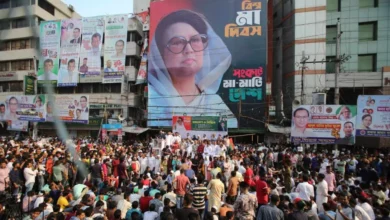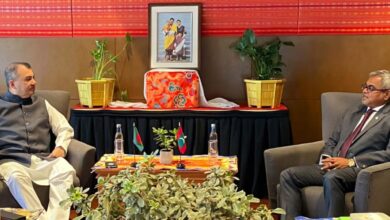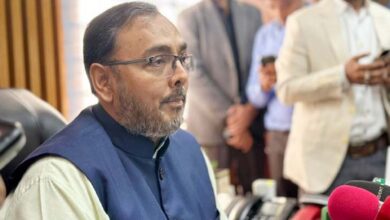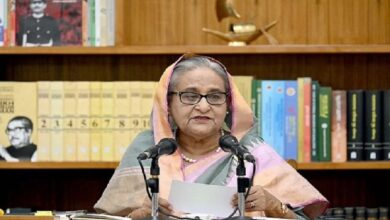Media attempts to discredit the leadership of Sheikh Hasina in Bangladesh

Dhaka; Recently an interview of Bangladesh PM Sheikh Hasina was published in a leading western digital newspaper.
Although the interviewer concedes that during her two decades in office Sheikh Hasina has presided over momentous poverty alleviation in her country of 170m, fuelled by average annual gdp growth of 7% , there is a discernibly disparaging tone throughout the article. The published ‘interview’ contains more opinions of the writer than any statements made by the Prime Minister herself.
However despite its condescending tone, the interviewer has to concede that Sheikh Hasina is indeed Asia’s ‘iron lady.’ What is perplexing though is the attitude of the interviewer towards PM Hasina’s personal tragedy in which, on 5 August 1975, a group of junior army officers invaded the presidential residence with tanks and killed her father Sheikh Mujibur Rahman ‘Bangabondhu,’ his family and personal staff. Mujib’s killing aside from being a ‘coup’, was also a mass slaughter.
When the shooting stopped, the Sheikh, his wife, three sons (one of whom was only 10), two newly wed daughters-in-law, a brother and a brother-in-law and other members of the household staff lay dead.
Only his daughters Sheikh Hasina and Sheikh Rehana, who were visiting West Germany at the time, escaped. They were banned from returning to Bangladesh.
A supercilious attitude marks the authors’ wording of the article and is demonstrative that he lacks any real sense of the deep wound that the killing of the Father of the Nation, Bangabandhu Sheikh Mujibur Rahman, left in the nation’s heart.
He was the greatest leader of a thousand years, for the Bengalis. For over two decades after the 1975 killing, the military dictators kept the name ‘Bangabandhu’ in exile from the nation he gave birth to by not allowing the return of his daughter Sheikh Hasina.
That his persona and leadership should inspire his daughter simply shouldn’t be a matter of derision. Bangabandhu was a man of indomitable courage and conviction and he had immense love for his country and wanted to transform Bangladesh into Sonar Bangla (Golden Bengal).
This desire made him challenge the Pakistani authorities who carried out oppression and discrimination on the people of East- Pakistan. This Charisma of his persona and conviction to the cause continues to be the nation’s inspiration.
And yet the article in the western media is disdainful of Prime Minister Hasina’s sense of loss by stating that her emotions of grievance and dynastic entitlement are becoming a threat to her legacy.
Further revealing the interviewer’s bias towards the Bangladesh Nationalist Party (BNP), the article describes Zia as a charismatic dynast.
It seems that authors are unaware of the sheer anarchy and lawlessness that prevailed in Bangladesh, during the BNP; not to mention rising extremism in the country.
The reality is that from Zia to Khaleda Zia, who was in power for 28 years, Bangladesh became a dysfunctional state, and could not change the fate of the people of Bangladesh.
The BNP culture of corruption and appeasing radical Islam in Bangladesh’s political culture was institutionalised by the late General Ziaur Rahman.
Sections of the media should perhaps be enlightened that the period 2001-06 is considered as one of the darkest chapters in the history of Bangladesh during which period large-scale corruption flourished with direct patronage from the highest level of the kleptocratic 4-Party Alliance Government led by BNP.
While some of their misdeeds were vaguely reported during the tenure of this deeply corrupt regime, it was during the 2007-08 caretaker government that the full extent of the institutional corruption, sponsored and sanctioned from the very top of the regime, started to become clear.
In 2014, BNP activists carried out systematic bombings on religious minorities, resulting in the worst election violence to date. The party’s dismal performance in the 2018 elections proved that its leaders had lost both support and sympathy.
Therefore before sounding disdainful or disparaging of Sheikh Hasina’s achievement’s and the attempts being made by the Awami League government the western media would do well to observe the tremendous journey that the young nation of Bangladesh has undertaken.
The country’s economic performance during the pandemic years was recognised in Bloomberg’s COVID-19 resilience ranking, where it ranked 24th out of 53 economies in the world that are worth over $200 billion.
And so despite all attempts to downgrade and discredit Sheikh Hasina’s regime the interviewer’s own opinion that Bangladesh has probably benefited from her iron grip and that she has wrought policies, including infrastructure investment, that have helped maintain the boom, which a weaker government might not have sustained.




